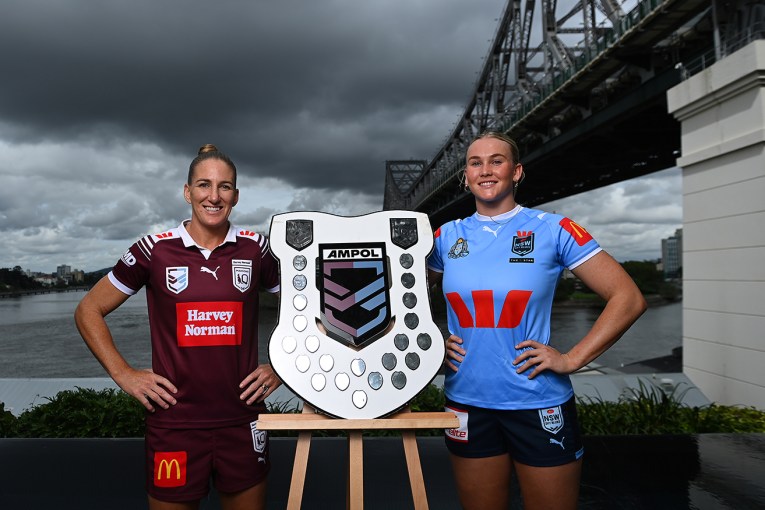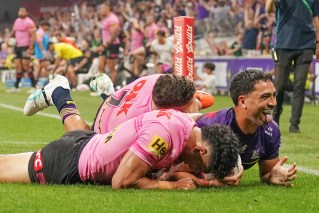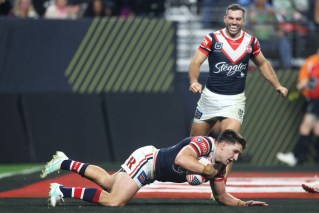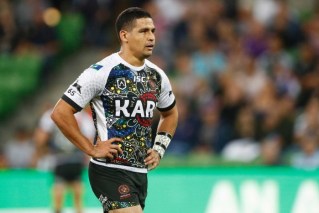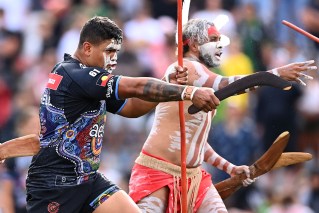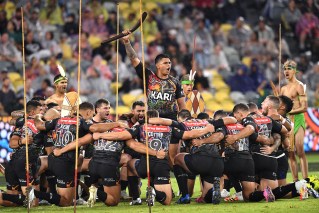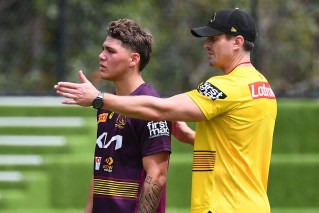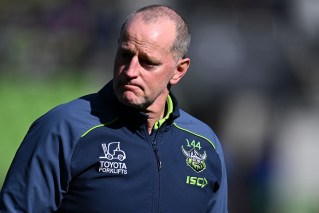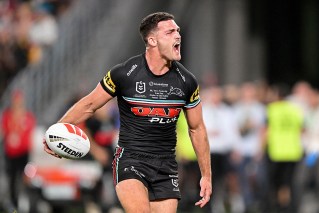Gladiators: Rabbitohs break 43-year drought
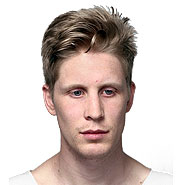
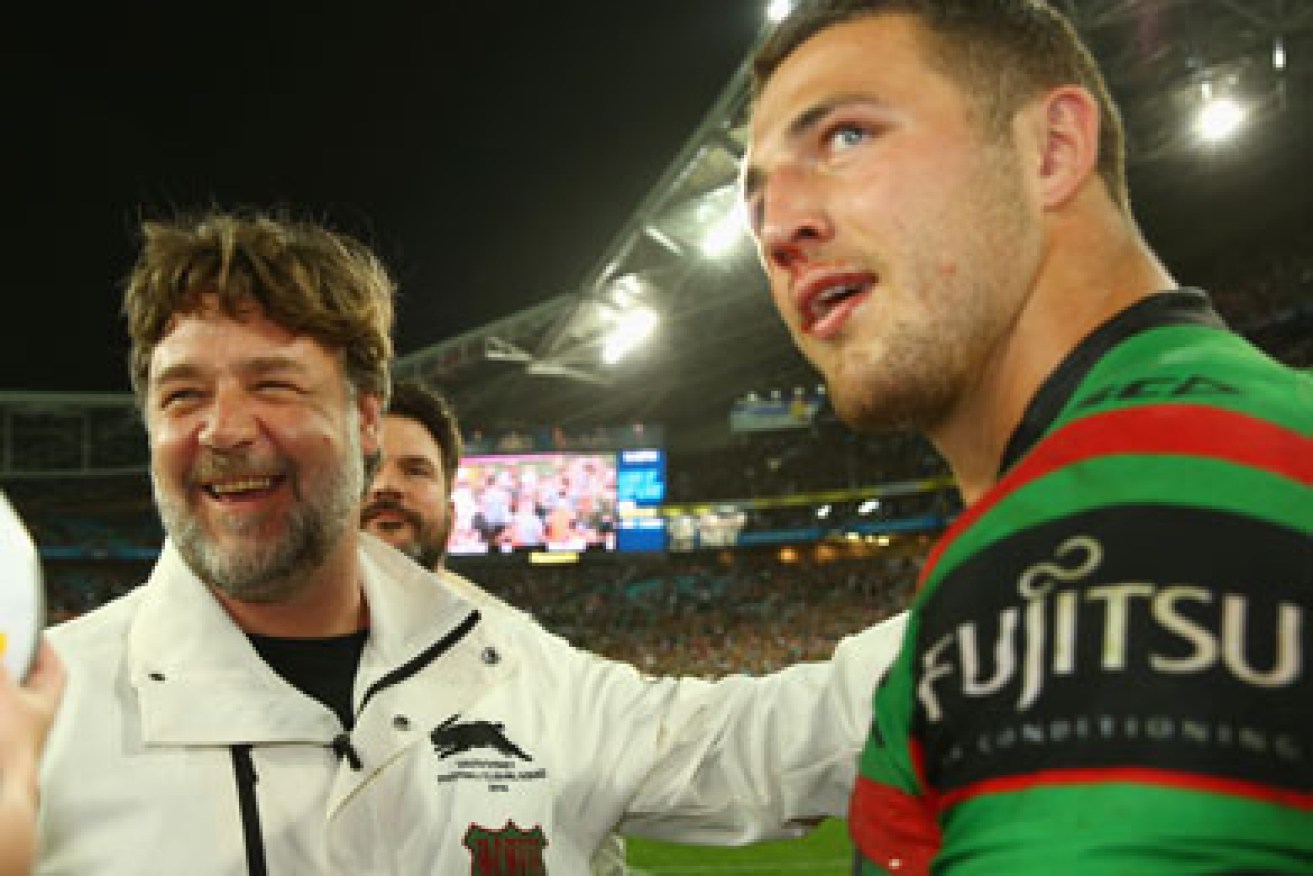
That's my boy: Russell Crowe and Sam Burgess after the game. Photo: Getty
And so, the march of the Rabbitohs ended in glory.
The extended green-and-red love-in, the tragicomic history, the expulsion, the marches, the court case, Rusty Crowe, the 43-year drought: it all made such a result seem inevitable.
• The match: forget the scoreline, this was a beauty
• Heroic Sam Burgess ‘does a Sattler’
The Dogs were worthy opponents. They just happened to be caught on the wrong side of history. And Sam Burgess.
It’s hard to remember a better Grand Final in recent times than South Sydney’s 30-6 triumph. Certainly it captured the imagination like none since the Super League schism: a match rich in narratives, steeped in history, charged by a tribal fervour. This was the Bunnies and the Bulldogs in a suburban war – the sort that made the game great.

That’s my boy: Russell Crowe and Sam Burgess after the game. Photo: Getty
However, for all the local mythology, the made-in-Redfern tale of redemption, the front row battle that decided the game was an English affair – a War of the Roses, no less.
James Graham (Canterbury, House of Lancaster) was immense: a pale, frosted vision of relentless physicality. Indeed, the only better player was Burgess.
Burgess (South Sydney, House of York) rightly won praise for his bravery after sustaining a fractured cheekbone in the opening seconds.
The pair halved that contest, but it was Burgess, with echoes of John Sattler’s 1970 heroics, that proved a match-winner, as much by his example as by his deeds. If you’ll forgive the loaded metaphor, he was a gladiator out there.
Were he a lesser player, you would call it a career-defining performance, but Burgess will almost certainly end up as one of the greats, whether in league or in rugby. This was his last hurrah for the Rabbitohs; he is due to return to England next week to play rugby union for Bath.
First, though, he will have surgery to repair his shattered cheekbone. “The doc seems to think I’ll need surgery on my face tomorrow,” he said after the match. “This cheek, it’s gone inwards.”
He said he knew immediately that his cheekbone was broken, but said there was little pain and deliberately avoided the medical staff in case they told him to leave the field. “The joy is over-riding the pain at the moment.”

George, the other Burgess, makes his bullocking run. Photo: Getty
Rabbitohs part-owner Russell Crowe, who recruited Burgess, paid tribute to “the sparky-eyed man”.
“I met him as a 20-year-old and he had this ambition,” Crowe said. “He’s carved his name deep in the history of rugby league.”
On the few occasions when Sam took a breather, there was another Burgess to step up, as George did to give Souths a second half lead with a magnificent bullocking run to the line.
Sadly for Canturbury, they only had one James Graham.
The Rabbitohs might have been sentimental favourites, but it was their bulldozing finals form that made the bookies take notice. The Bunnies had power from front to back, that much was plain to see, but on Sunday it became clear that they had a cause as well.
Rather than letting it weigh them down, Souths rode the hope and the expectation. In a brutal first half, both sides landed heavy blows, but only Souths seemed to come away with metres. Canterbury cancelled out Souths’ lead through a Tony Williams try, but then George Burgess turned the game.
Ultimately, even physics was wearing green and red. Until the 72nd minute, Greg Inglis’ sole contribution had been an admittedly spectacular line-break. Then, he squeezed out a speculative chip. A fiendish bounce eluded two onrushing players before nestling just short of the dead ball line. A grateful Kirisome Auva’a touched down, and you could feel that 43-year weight start to lift.

Slash was not the highlight of the night. Photo: Getty
Minutes later, another right-angle bounce, another try, and the fix was in – fate had made up its mind. There was time for Greg Inglis to finish off a breakaway, and for Sam Burgess to attempt the conversion: through a mist of tears and a broken cheekbone, he came remarkably close.
The ghosts of ‘71 became just that – ghosts. The dark days of 2000 and 2001, when they were excluded from the competition, are now little more than a footnote in this new history.
Crowe, who was at the forefront of the battle for survival, spoke of his “deep, deep satisfaction”. “It’s a grand reward for everyone who stepped up to the plate and decided that we weren’t going to put up with South Sydney being a losing club anymore.”
At its worst, modern league can resemble an ongoing experiment, a study in how much tacky crassness is required to ruin the visceral thrill of a wonderful game.
But nothing could ruin this – not the sad sight of Slash’s inverse-karaoke act, nor the bizarre sight of Train getting a paid gig in 2014, not even Sarah McLeod and her leather-clad, trophy-worshipping drum cult.
A record crowd of 83,833 had just witnessed one of league’s great occasions.
Oh, and Sam? Thank you, and good luck.
